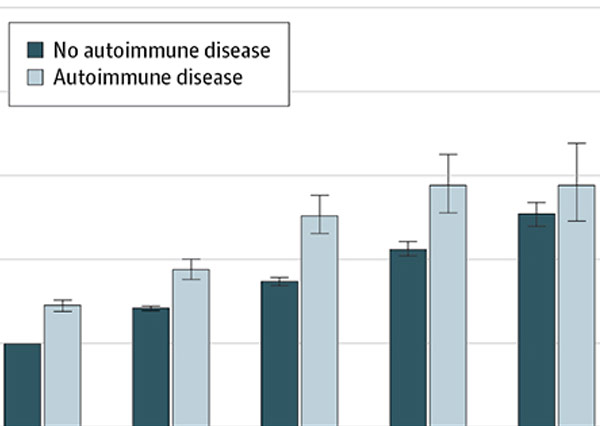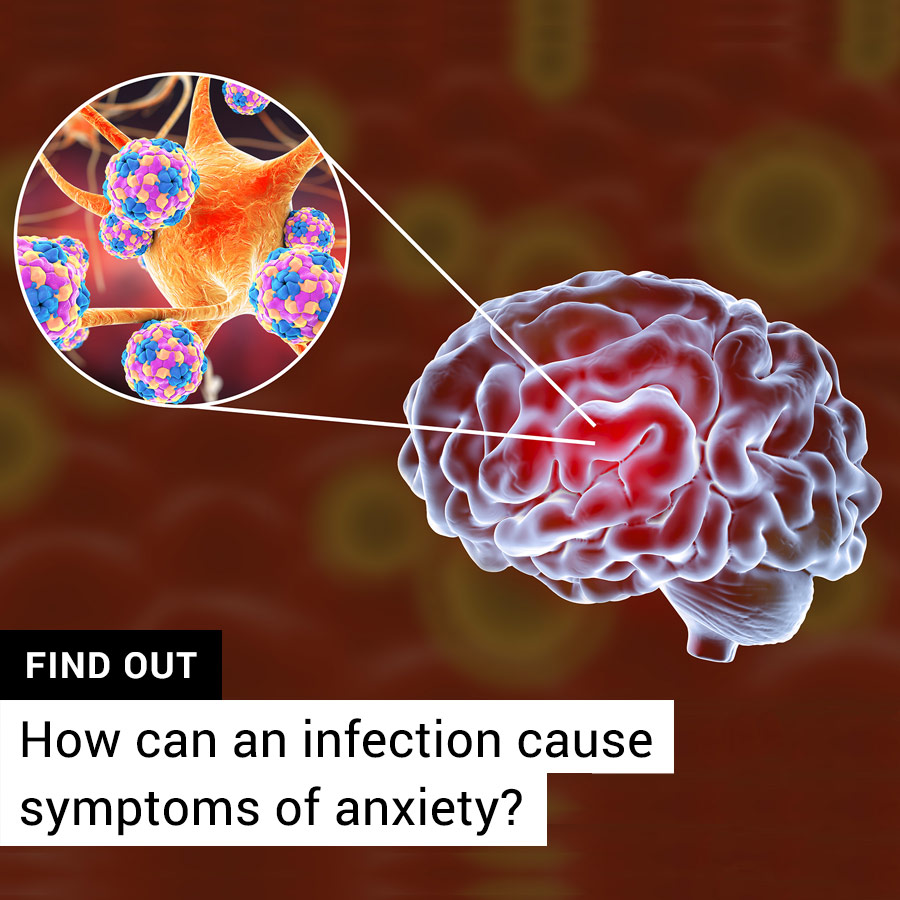Disorders
Can infections cause anxiety that won’t go away?
Anxiety disorders fall into different categories depending upon the symptoms. An individual may suffer from generalized anxiety, panic attacks, phobias and social anxiety. A child may exhibit sudden onset of severe anxiety when leaving a parent’s side. This is known as separation anxiety and is often seen in children with PANS or PANDAS.
In some people, infections can trigger symptoms such as irrational fears typically associated with an anxiety disorder. For example, viral infections in childhood (i.e. chickenpox, measles, mumps) have been found to not only precede but also contribute to the risk of developing social phobias.
Whooping cough, scarlet fever, mumps, diphtheria, typhus and dysentery have all been linked to an increased likelihood of having an anxiety disorder in adults. 3 And influenza, varicella-zoster virus (known to cause chicken pox and shingles), HIV/AIDS, hepatitis C 4 and cytomegalovirus (CMV) 5 have been implicated in anxiety and depression.
Childhood infections may increase risk of anxiety disorder
Additionally, children who develop a severe infection in their first year of life may be at greater risk of developing an anxiety disorder later in childhood and adolescence. 6
“The data suggest that early severe infection may be related to increased likelihood of major depression, overanxious disorder, separation anxiety, and specific phobia, compared to those without infection, who were not exposed to infection early in life.” 6
Immune dysfunction may result in anxiety symptoms
When an infection enters the body, the immune system produces antibodies to destroy the harmful substance. But in some people, these antibodies mistakenly attack healthy cells in the brain. This can result in brain inflammation and the onset of symptoms that mimic psychiatric illnesses, such as anxiety that will not go away and depression.
In these cases, the patient may not have an anxiety disorder but possibly an infection-triggered autoimmune encephalopathy. Symptoms, such as irrational fears (phobias), anxiousness, panic attacks could be a result of an autoimmune attack on the brain.
Individuals who have anxiety symptoms that appear suddenly, will not go away or do not respond to standard treatment may have an infection-induced autoimmune encephalopathy, rather than a primary psychiatric illness.The distinction is important, so check with your doctor since treatment differs for each condition. An infection-triggered autoimmune neuropsychiatric disorder (such as PANS and PANDAS) is often treated by eliminating any infection(s), reducing brain inflammation and stopping the attack on the immune system which typically involves immunomodulatory treatments. 7
- Witthauer C, Gloster AT, Meyer AH, Goodwin RD, Lieb R. Comorbidity of infectious diseases and anxiety disorders in adults and its association with quality of life: a community study. Front Public Health. 2014;2:80. Published 2014 Jul 14. doi:10.3389/fpubh.2014.00080 https://www.ncbi.nlm.nih.gov/pmc/articles/PMC4095564/
- Ajdacic-Gross V, Aleksandrowicz A, Rodgers S, et al. Social Phobia Is Associated with Delayed Onset of Chickenpox, Measles, and Mumps Infections. Front Psychiatry. 2016;7:203. Published 2016 Dec 27. doi:10.3389/fpsyt.2016.00203 https://www.ncbi.nlm.nih.gov/pmc/articles/PMC5186793/
- Witthauer C, Gloster AT, Meyer AH, Goodwin RD, Lieb R. Comorbidity of infectious diseases and anxiety disorders in adults and its association with quality of life: a community study. Front Public Health. 2014;2:80. Published 2014 Jul 14. doi:10.3389/fpubh.2014.00080 https://www.ncbi.nlm.nih.gov/pmc/articles/PMC4095564/
- Coughlin SS. Anxiety and Depression: Linkages with Viral Diseases. Public Health Rev. 2012;34(2):92. https://www.ncbi.nlm.nih.gov/pmc/articles/PMC4175921/
- Anna C. Phillips, Douglas Carroll, Naeem Khan, Paul Moss Brain. Cytomegalovirus is associated with depression and anxiety in older adults. Behav Immun. 2008 Jan; 22(1): 52–55. Published online 2007 Aug 20. doi: 10.1016/j.bbi.2007.06.012 https://www.ncbi.nlm.nih.gov/pubmed/17703915/
- Goodwin RD. Association between infection early in life and mental disorders among youth in the community: a cross-sectional study. BMC Public Health. 2011;11:878. Published 2011 Nov 21. doi:10.1186/1471-2458-11-878 https://www.ncbi.nlm.nih.gov/pmc/articles/PMC3248872/
- Jennifer Frankovich, Susan Swedo, Tanya Murphy, Russell C. Dale, Dritan Agalliu, Kyle Williams, Michael Daines, Mady Hornig, Harry Chugani, Terence Sanger, Eyal Muscal, Mark Pasternack, Michael Cooperstock, Hayley Gans, Yujuan Zhang, Madeleine Cunningham, Gail Bernstein, Reuven Bromberg, Theresa Willett, Kayla Brown, Bahare Farhadian, Kiki Chang, Daniel Geller, Joseph Hernandez, Janell Sherr, Richard Shaw, Elizabeth Latimer, James Leckman, Margo Thienemann, and PANS/PANDAS Consortium. Journal of Child and Adolescent Psychopharmacology. Sep 2017.574-593. http://doi.org/10.1089/cap.2016.0148 https://www.liebertpub.com/doi/full/10.1089/cap.2016.0148

“The results of this study suggest that specific infectious diseases are associated with significantly increased prevalence of anxiety disorders.” 1
Learn more about how infections can trigger neuropsychiatric symptoms

Cunningham Panel™ helps identify an autoimmune disorder in child initially diagnosed with schizophrenia
Researchers describe a complex case involving a 15-year-old girl, who abruptly developed multiple neurologic and psychiatric symptoms.

Autoimmune diseases and severe infections as risk factors for mood disorders: a nationwide study
This nationwide, population-based, prospective cohort study examines the link between mood disorders, infections, and autoimmune disease.

Childhood infections can increase risk of mental illness in kids
Nationwide study finds both mild and severe infections can increase risk of mental disorders in children and adolescents.









